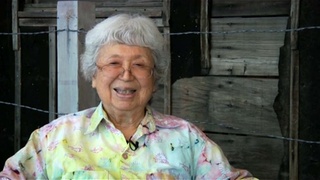Interviews
Playing traditional gagaku while creating an identity
When Togi taught our gagaku group, we became proficient enough that they asked us to play at the Olympics at a venue. So we’re outside playing gagakuand so this guy from Japan was watching us – and he assumed we were Japanese because we were playing gagaku. So he came up and said something to Ronnie, one of our members. And Ronnie doesn’t speak Japanese. So he says, “What?” and so this guy did [speak English]. He said, “Oh, you’re American?” And Ronnie said, “Yeah.” And he says, “You can’t play gagaku!” And Ronnie said, “I just did.” And he said, “Oh no, no, gagakuis the soul of Japanese music and you have to be from Japan.” And so Ronnie leaned over and said, “Do you know the piece that we just played? What’s the name of it?” And he didn’t know of course. So Ronnie said, “Get out of my face.”
And that was an important moment because for the first time, a Sansei was saying, “No, this is my music and I know what it is and I don’t need you to tell me what it is by accident of birth.” And that was a pivotal moment for our group. And everyone really felt that. This generation is saying “Whatever we are, this is what we are and we’re not going to be intimidated anymore simply because…by birth.” And ours is different. It is different so that when we go to Japan, we do not expect this in Japan. We expect something very different.
Date: December 3, 2004
Location: California, US
Interviewer: Art Hansen, Sojin Kim
Contributed by: Watase Media Arts Center, Japanese American National Museum
Explore More Videos












Postwar school-life
(b. 1930) Half Japanese and grew up in both Japan and the United States.

On Challenging Institutions
(1938-2020) Japanese American attorney and civil rights activist

Pop and Balls
(1938-2020) Japanese American attorney and civil rights activist

Re-examining Identity
(1941-2018) Japanese Canadian photojournalist and activist
